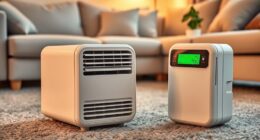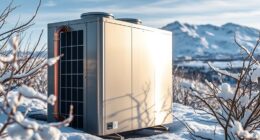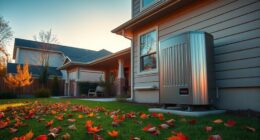Fed up with soaring energy costs and ineffective heating? We have the perfect solution for you!
In this article, we’ll show you how to enhance your heat pump’s energy efficacy and save money in the process. From understanding efficiency ratings to optimizing performance, we’ll cover all the key factors that impact your heat pump’s efficiency.
Plus, we’ll share effective maintenance practices and advanced techniques that will take your heat pump’s energy efficiency to the next level.
Get ready to enjoy a more efficient and cost-effective heating system!
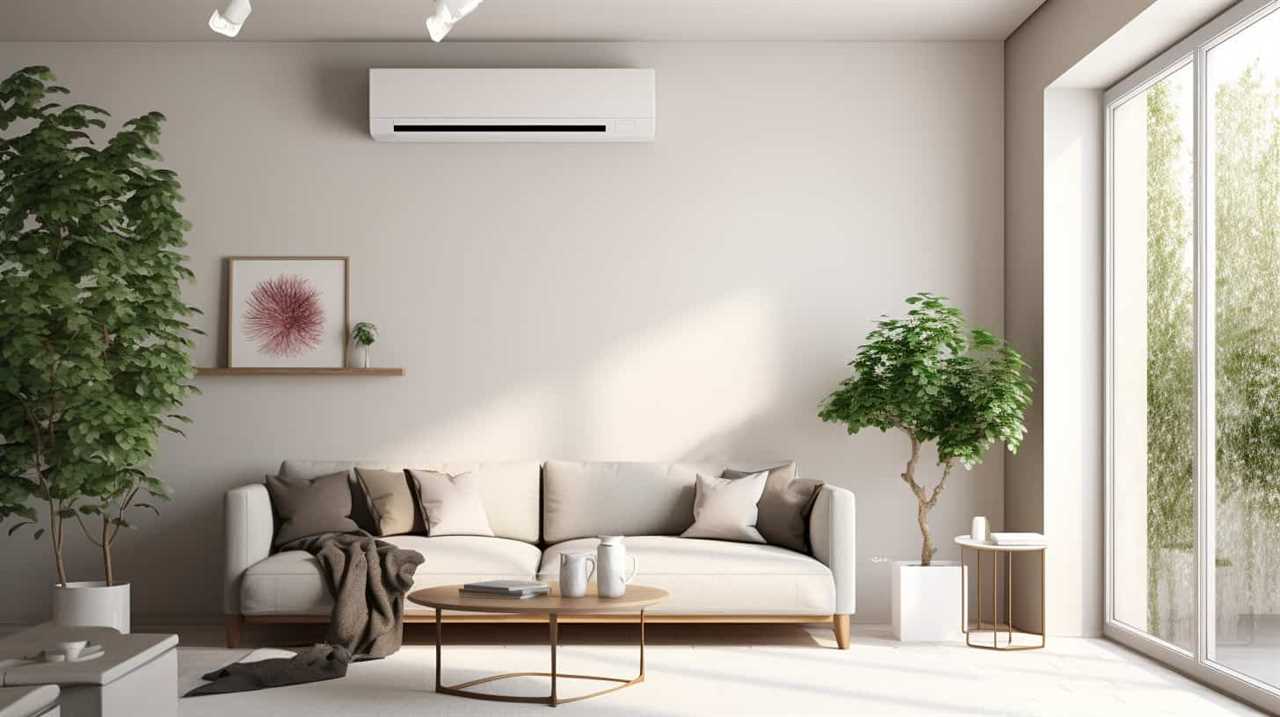
Key Takeaways
- Regularly clean or replace air filters and clear outdoor unit from debris for proper airflow and efficiency
- Schedule professional maintenance to identify and fix issues and ensure all components are functioning correctly
- Use a programmable thermostat and proper insulation to reduce unnecessary energy consumption and minimize thermal losses
- Implement advanced techniques such as heat pump controls and smart thermostats for precise temperature control and enhanced energy efficiency
Understanding Heat Pump Efficiency Ratings
Let’s dive into the different heat pump efficiency ratings and how they can help us determine the energy efficiency of our heat pump.
Heat pump efficiency standards play a crucial role in assessing the performance of these systems. The most common rating is the Seasonal Energy Efficiency Ratio (SEER), which measures the cooling efficiency during a typical cooling season.
Another important rating is the Heating Seasonal Performance Factor (HSPF), which gauges the heating efficiency of a heat pump over an entire heating season.
These ratings allow us to compare different models and make informed decisions based on their energy efficiency.

Calculating heat pump energy efficiency involves considering the ratio of heating or cooling output to the electrical energy input.
Optimizing Heat Pump Performance for Energy Savings
To maximize energy savings, we can optimize the performance of our heat pump. Here are some energy-saving tips for heat pump maintenance:
-
Regularly clean or replace air filters: Dirty filters restrict airflow, causing the heat pump to work harder and consume more energy.
-
Keep the outdoor unit clear: Remove debris, leaves, and dirt from around the outdoor unit to ensure proper airflow and efficiency.
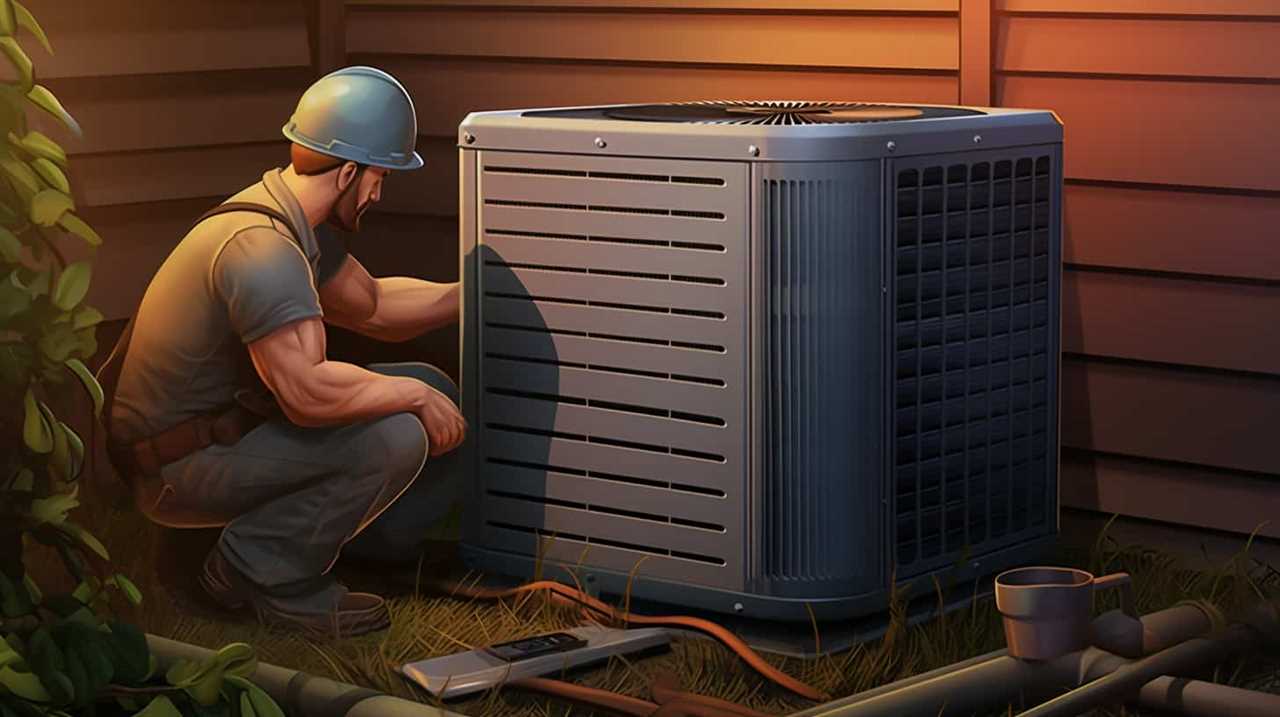
-
Schedule professional maintenance: Regular maintenance by a qualified technician can identify and fix any issues, improving the heat pump’s performance and energy efficiency.
-
Use a programmable thermostat: Set temperature schedules to match your daily routine, reducing unnecessary energy consumption.
By following these energy-saving tips, you can optimize your heat pump’s performance and increase its energy efficiency.
Now, let’s explore the key factors that impact heat pump energy efficiency.

Key Factors That Impact Heat Pump Energy Efficiency
One of the main factors that impact heat pump energy efficiency is the size of the unit. Proper heat pump sizing is crucial to ensure optimal performance and energy savings. A heat pump that’s too small for the space it needs to heat or cool will struggle to meet the desired temperature, leading to increased energy consumption. On the other hand, an oversized heat pump will cycle on and off frequently, resulting in inefficient operation and higher energy costs.
Climate considerations also play a significant role in heat pump energy efficiency. Heat pumps are more efficient in moderate climates, where the temperature remains relatively stable. In extreme cold or hot climates, heat pumps may need additional support or backup systems to maintain efficiency. It’s essential to consider the specific climate conditions when selecting and installing a heat pump for optimal energy efficiency.
Effective Maintenance Practices for Improving Heat Pump Efficiency
We regularly clean and replace air filters to optimize our heat pump’s efficiency. However, heat pump maintenance goes beyond just filter cleaning. Here are some energy-saving strategies for effective heat pump maintenance:
-
Regularly inspect and clean the outdoor unit: Remove any debris, leaves, or dirt that might obstruct airflow and reduce the heat pump’s efficiency.
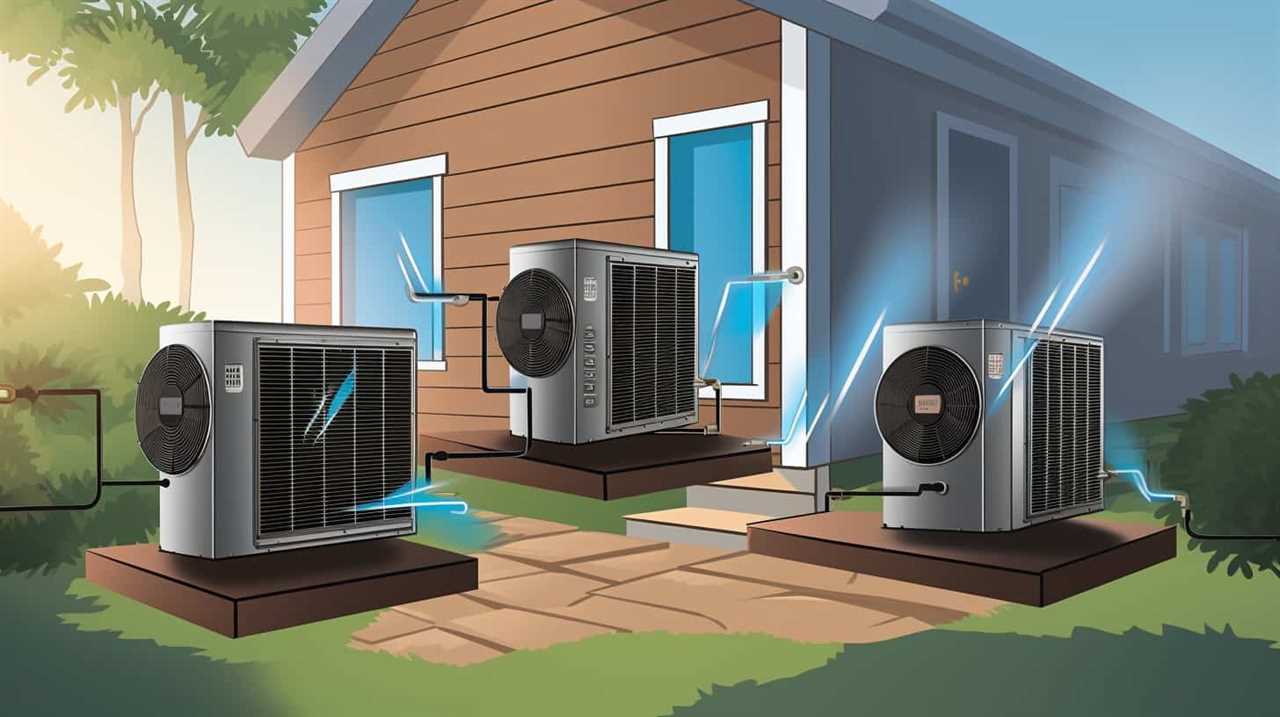
-
Check and clean the indoor coil: Dust and dirt accumulation on the indoor coil can restrict airflow, leading to decreased performance. Regular cleaning ensures optimal heat exchange.
-
Monitor and maintain refrigerant levels: Low refrigerant levels can hinder the heat pump’s ability to transfer heat effectively. Regularly check and recharge refrigerant as needed.
-
Schedule professional maintenance: Regular maintenance by a qualified technician ensures that all components are functioning correctly, improving efficiency and preventing potential issues.
By following these maintenance practices, you can enhance your heat pump’s energy efficiency and prolong its lifespan.
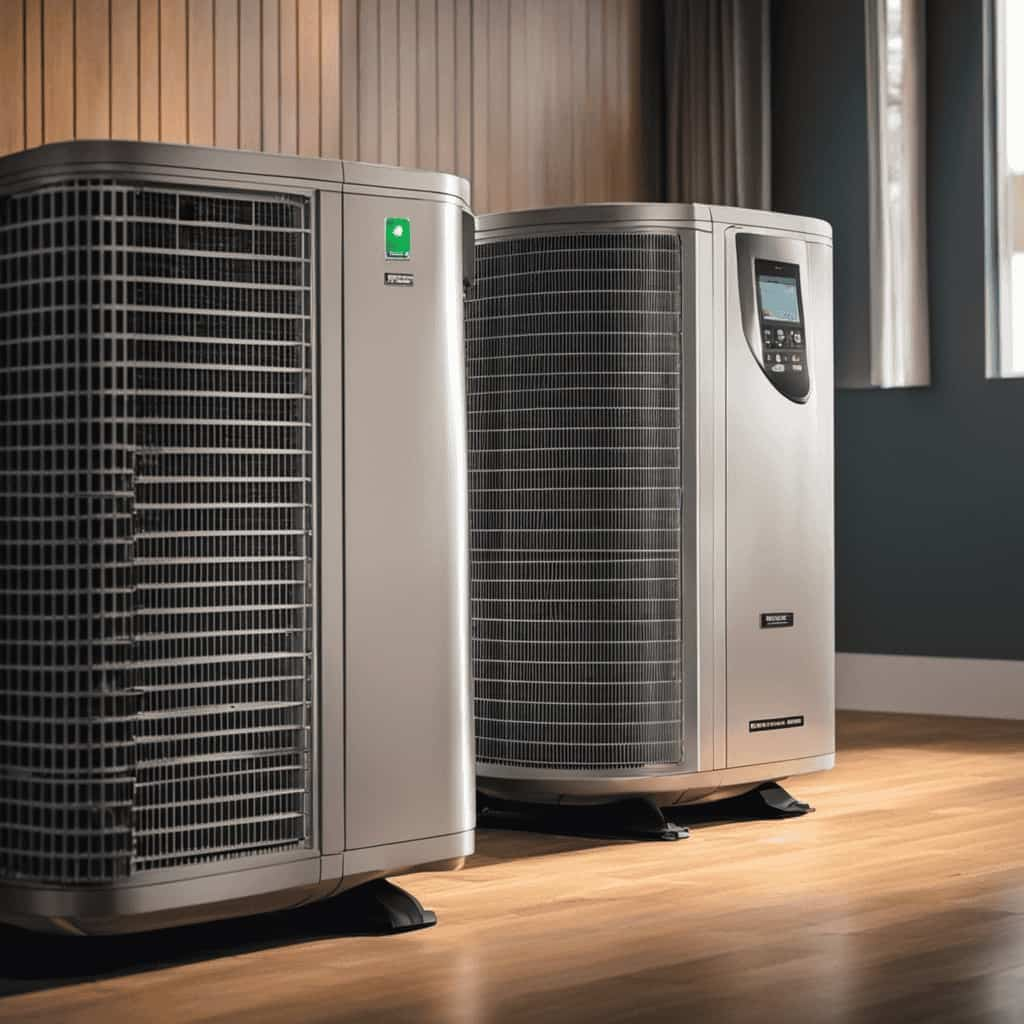
Now, let’s explore some advanced techniques to further enhance heat pump energy efficacy.
Advanced Techniques to Enhance Heat Pump Energy Efficacy
By implementing advanced techniques, we can further enhance the energy efficacy of our heat pump. Two key areas to focus on for maximizing efficiency are heat pump insulation and heat pump controls.
Effective heat pump insulation is crucial in preventing heat loss and improving energy efficiency. By properly insulating the heat pump unit and the surrounding ductwork, we can minimize thermal losses and ensure that the heat generated is efficiently distributed throughout the space. Insulating materials such as foam or fiberglass can be used to create a barrier that prevents heat from escaping.
In addition to insulation, optimizing heat pump controls can significantly improve energy efficacy. Advanced control systems allow for precise temperature regulation, efficient heat transfer, and better management of energy consumption. Features like programmable thermostats, variable-speed compressors, and smart controls enable us to customize the heating and cooling settings based on our needs and schedule, resulting in reduced energy waste and increased efficiency.

Implementing these advanced techniques in heat pump insulation and controls will not only enhance energy efficacy but also contribute to a more sustainable and cost-effective heating and cooling solution.
| Techniques for Enhanced Energy Efficacy | Benefits |
|---|---|
| Proper heat pump insulation | Minimizes heat loss, improves energy efficiency |
| Optimized heat pump controls | Precise temperature regulation, efficient heat transfer, reduced energy waste |
| Programmable thermostats | Customizable heating and cooling settings based on needs and schedule |
| Variable-speed compressors | Optimal energy consumption based on demand |
| Smart controls | Intelligent management of energy usage for maximum efficiency |
Frequently Asked Questions
Can I Use My Heat Pump to Cool My Home During the Summer Months?
Yes, you can use your heat pump to cool your home during the summer months. It offers benefits like energy efficiency, but there may be drawbacks such as reduced cooling capacity. Common issues can be troubleshooted.
What Should I Do if My Heat Pump Is Not Performing Efficiently?
If your heat pump is not performing efficiently, there are a few steps we can take to improve its energy efficacy. Regular heat pump maintenance and keeping an eye out for signs of inefficiency are essential.
Are There Any Government Incentives or Rebates Available for Improving Heat Pump Energy Efficiency?
Yes, there are government programs and financial incentives available for improving heat pump energy efficiency. These programs provide rebates and incentives to encourage homeowners to upgrade their heat pumps and reduce energy consumption.
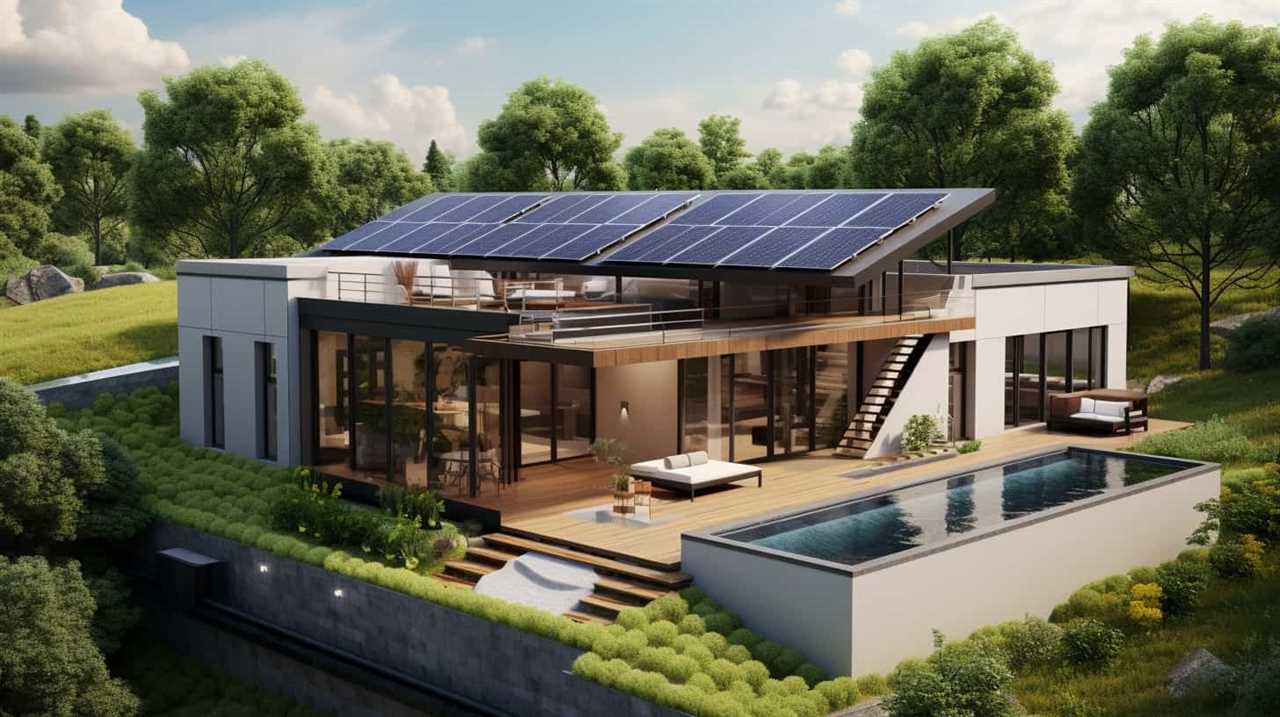
Can I Install a Heat Pump Myself, or Do I Need to Hire a Professional?
Installing a heat pump yourself may seem tempting, but it’s important to consider the benefits of hiring a professional. They have the expertise and knowledge to ensure the installation is done correctly and efficiently, maximizing your heat pump’s energy efficiency.
How Do I Determine the Appropriate Size of Heat Pump for My Home?
To determine the appropriate size of a heat pump for your home, you need to consider heat pump sizing guidelines and factors that affect size selection. These factors include the climate, insulation, and square footage of your home.
Conclusion
In conclusion, by understanding heat pump efficiency ratings, optimizing performance, considering key factors, and implementing effective maintenance practices, you can greatly enhance the energy efficacy of your heat pump.
But there’s more! Stay tuned for advanced techniques that will take your heat pump’s energy efficiency to the next level.

Don’t miss out on these game-changing strategies that will save you money and decrease your carbon footprint.
Get ready to unlock the full potential of your heat pump!







